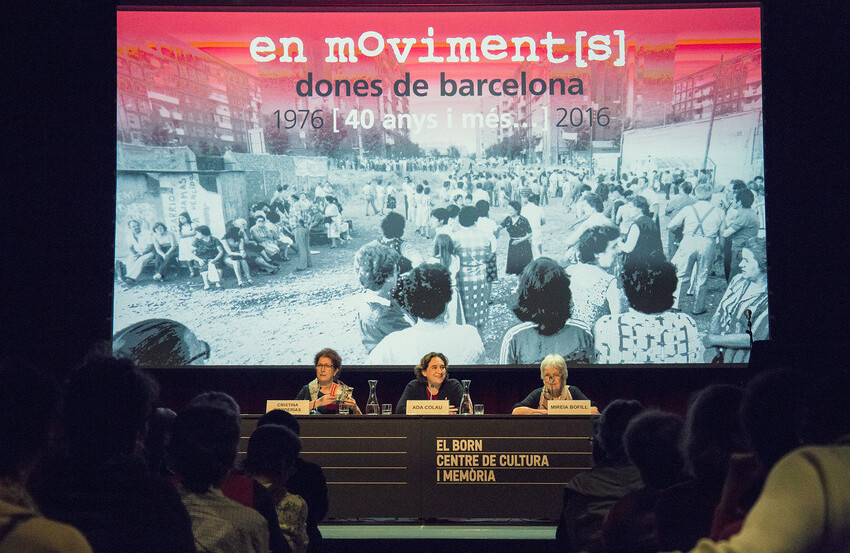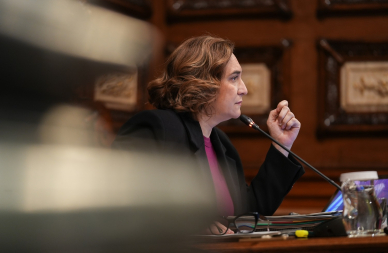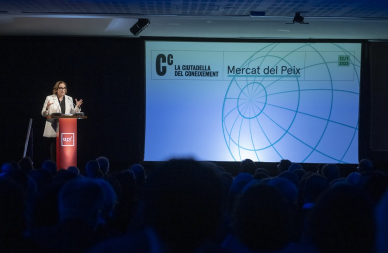24/02/2023
Get to know the Mayor better
Presentation of the “In Movement[s]. Barcelona’s women. 40 years and more” project
Share it
Speech of the day 28/11/2016

“Women’s history is a collective history, a history of alliances against oppression and inequality.”
Deputy Mayor,
Councillors,
A very good morning to everyone.
Today, we are here to present the project “In Movement(s). Barcelona’s women. 40 years and more... (1976-2016)”. Special thanks to Cristina Borderias, who has acted as curator, and Mireia, but also to all of you for being here, because this place is full of leading figures. We have come across many of you and we have come together in spaces of feminist, local-resident, social and political struggle in this city. So I am a little nervous about speaking in front of you, because many of you could easily be on this side of the table.
We are here to remember in the present, because many of us have come a long way, but we will go still further. We are here to defend the fact that women are also people and that, in reality, we represent 50% of society, a strange sort of minority which is, in fact, half of the population, who have taken part in demonstrations, strikes, local-resident mobilisations, trade-union struggles and preventing evictions. However, we have always been under-represented in history books, in official acknowledgements in the city and the country and in history around the world.
We know that it is really important to recover the memory of many women who managed to become leading figures in politics and activism, women scientists, women writers, and that we have to recover the biographies of those women who have left their mark in these fields. We are also here because we need to change the perspective of history and we need to think about memory, about writing history in a different way, and women have a lot to say in this. We want to recover the voice and experience not only of women who were outstanding in various fields, but that of all women, because all of them have been essential. Many of them are invisible in history books, but even though they were not politicians, writers, activists or scientists, many women have helped to forge our history.
Whether they went on strike or were unable to go on strike, the history of women is essentially a collective history, a story of alliances against oppression and inequality.
This is the sense behind this project, rescuing “the memory of women’s mobilisations to improve the lives of city neighbourhoods and to build fairer, more democratic and more equitable social relations”. And we are doing this on the fortieth anniversary of the Catalan Women’s Conference in 1976, which marked a turning point, in that it allowed us to see, once again, that we have a lot more power than some people, for a very long time, have wanted us to think.
Now I will hand over to Cristina Borderias, the project curator, and to Mireia Bofill from Ca La Dona, one of our city’s historic feminist organisations, who will tell us about the project. Many thanks for being here and for making this possible.
Closing words
There is a quotation from Emily Dickinson that might help to illustrate what we are doing and remembering today. It goes: “We never know how high we are till we are called to rise”.
And effectively, during those three days at the University of Barcelona’s Paranimf, the women who were there broke their silence, gave visibility to our power as a group, as women, reminded political parties, trade unions and institutions that the recovery of democratic freedoms could not occur without us. Thank you! We are here thanks to you and we are very much aware of it.
Since then, as women, we have achieved major advances in the area of civil rights and liberties: from abolishing the crime of adultery to the formal recognition of equality in marriage, from the creation of self-managed neighbourhood family-planning centres to the fact that today we have a Councillor for Feminism and LGTBI Affairs at Barcelona City Council. Furthermore, the entire municipal government of men and women recognise that they are indebted to the feminist movement.
We need to remember that none, absolutely none, of these milestones would have come about without the mobilisation and participation of women. The best way to remember your legacy is to place all your energy into defending it.
We must not be complacent, there is still a long way to go. We are still living in a male-chauvinist, patriarchal society that continues to discriminate against women for the mere fact of being women, and we can see this discrimination repeated in all areas of life: in family, work, academic, healthcare and economic aspects. And the negation and tutelage of our sexual and reproductive rights continues to be part of our everyday lives.
The maximum expression of the phenomenon, as we remembered on Friday, is gender violence, with femicide as its most brutal aspect. This year, feminist organisations have already counted 94 femicides, which is only the tip of the iceberg formed by a much more structural violence that cuts across our society as a whole. And what is worse, this structural violence is normalised; it is not seen with alarm, nor does it give rise to the official response that it should. Due to the accumulated work of those who came before us, which gives us oxygen and strength, we are well aware that we need to get to the root of the problem, the social causes that favour it.
The struggle for women’s rights is not just a struggle for equality, it is also a struggle for the emancipation of humanity. Each of your struggles against violence, inequality and discrimination ends up benefiting all of us, men and women. Because we want a fair, egalitarian, happy, sustainable and caring society for our children; today we are more feminist than ever.
For this reason, projects like “In Movement(s)” are so important for the City of Barcelona as a whole. Because they not only serve to recognise the contribution of women in collective struggles, but they also empower us and give us a mirror and the example of leading figures in emancipation, which we must use to give us the strength to work towards a freer, fairer and more democratic Barcelona, or in other words, a more violet Barcelona.
Many thanks to everyone, to those involved in its promotion, to all the women who participated in debates, to those who are sure to make contributions. Many thanks to those who came before us and those who are here today.

